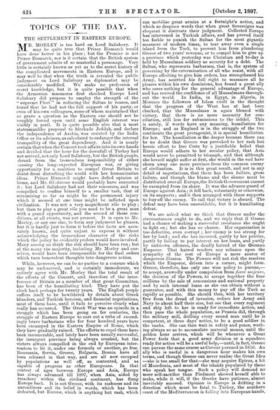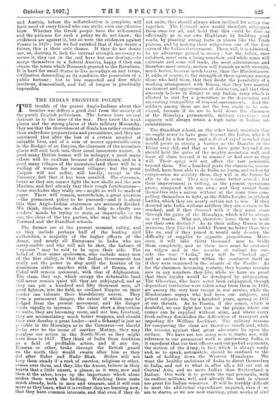TOPICS OF THE DAY.
THE SETTLEMENT IN EASTERN EUROPE.
MR. MORLEY is too hard on Lord Salisbury. It may be quite true that Prince Bismarck would have done better in his place ; but the Premier is not Prince Bismarck, nor is it certain that the British system of government admits of so masterful a personage. Very little is certainly known as yet as to the secret history of the complicated movements in Eastern Europe, and it may well be that when the truth is revealed the public judgment on Lord Salisbury as diplomatist may be considerably modified. We make no profession of secret knowledge, but it is quite possible that when the Armenian massacres first shocked Europe Lord Salisbury did propose to employ the strength of the " supreme Fleet" in reducing the Sultan to reason, and found that he had not the full support of his party, or even of his own colleagues, some of whom maintained that so grave a question as the Eastern one should not be roughly forced open until some English interest was visibly in peril. It is quite possible also that a most statesmanlike proposal to blockade Jeddah, and declare the independence of Arabia, was resisted by the India Office or its advisers, as calculated to endanger the internal tranquillity of the great dependency. And it is nearly certain thatwhen the Concert took affairs into its own hands and decided that the hour for the downfall of Turkey had not arrived, not only Lord Salisbury, but the British people, shrank from the tremendous responsibility of either causing the long-expected European war, or giving opportunity for a coalition to compel Great Britain to desist from disturbing the world with her humanitarian ideas. Prince Bismarck might have defied opinion at home, and Mr. Gladstone would probably have converted it ; but Lord Salisbury had not their resources, and was compelled to confine himself to a smaller task, that of minimising so far as might be the permanent injury which it seemed at one time might be inflicted upon civilisation. It was not a very magnificent role to play ; but then to play a great role you need to be a great man with a grand opportunity, and the second of those con- ditions, at all events, was not present. It is open to Mr. Morley, or any one else, to form any judgment he pleases, but it is hardly just to form it before the facts are accu- rately known, and quite unjust to express it without acknowledging the tremendous character of the risks which the policy he evidently prefers would have involved. Many among us think the risk should have been run ; but of the many the majority, including Mr. Morley and our- selves, would have been irresponsible for the final orders which turn benevolent thoughts into dangerous action.
While, however, we can be no parties to a censure which may be undeserved, and is certainly immoderate, we entirely agree with Mr. Morley that the total result of the efforts of the Concert, and therefore of the inter- ference of Britain as a member of that great Committee, has been of the humiliating kind. They have put the clock back perhaps for twenty years. The English people suffers itself to be bewildered by details about Greek blunders, and Turkish heroism, and financial negotiations, most of them base, until it fails to perceive clearly what really has occurred. The Greek War was an episode in a struggle which has been going on for centuries, the struggle of Eastern Europe to cast out a tribe of exceed- ingly brave barbarians who for four hundred years have been encamped in the Eastern Empire of Rome, which they have gradually ruined. The efforts to expel them have been innumerable, and lately have been usually successful, the insurgent province being always crushed, but the victors always compelled in the end by European inter- vention to let it, under one formula or another, go free. Roumania, Servia, Greece, Bulgaria, Bosnia have all been released in that way, and are all now occupied by populations as well off, as contented, and as capable of progress as other Europeans. In that contest of ages between Europe and Asia, Europe has always advanced till 1897, when Asia, aided by treachery within the civilised continent, has flung Europe back. It is not Greece, with its rashness and its unreadiness and its belief in words, which has been defeated, but Europe, which is anything but rash, which can mobilise great armies at a fortnight's notice, and which so despises words that when great Sovereigns wax eloquent it distrusts their judgment. Collected Europe has intervened in Turkish affairs, and has proved itself too feeble to punish the Sultan for the most gigantic massacre of modern times, to tear away even a single island from the Turk, to prevent him from plundering Greece of two years' revenue, or to compel him to give up a province which yesterday was Christian and to-day is held by Mussulman soldiery as security for a debt. The Sultan, who represents barbarism, that is, the system of governing by the extermination of all who resist, with all Europe affecting to give him orders, has strengthened his Army, has asserted his full right to massacre all he pleases within his own dominions, has found a great ally who cares nothing for the general advantage of Europe, and has revived the confidence of all Mussulmans through- out the world. In India, in Egypt, in Algeria, in Morocco the followers of Islam exult in the thought that the progress of the West has at last been checked, that the Mussulman is again blessed with victory, that there is no more necessity for con- ciliation, still less for submissions to the infidel. This is surely, if words have any meaning, humiliation for Europe ; and as England is in the struggle of the two continents the great protagonist, it is special humiliation for her. The humiliation is the deeper because there can be no doubt that Greece was provoked to her rash but heroic effort to free Crete by a justifiable belief that Europe would adhere to her secular policy, that Asia would never be permitted to triumph, and that although she herself might suffer at first, she would in the end have shorn away one more province from the common enemy of civilisation. It is in this great result, and not in any detail of negotiations, that there has been failure, gross failure, and though the blame and the shame must be distributed overall Europe,the British Government cannot be exempted from its share. It was the advance guard of Europe against Asia ; it fell back, voluntarily or otherwise, on its supports ; and it then arranged with those supports to buy off the enemy. To call that victory is absurd. The defeat may have been unavoidable, but it is humiliating defeat.
We are asked what we think that Greece under the circumstances ought to do, and we reply that if Greece had a chance of making a successful resistance she ought to fight on ; but she has no chance. Her organisation is too defective, even corrupt ; her enemy is too strong for her by land ; and she has incurred, partly by her politics, partly by failing to pay interest on her loans, and partly by unknown offences, the deadly hatred of the German Emperor. That hatred renders any reliance upon the- sympathy of the rest of Europe a mere source of dangerous illusion. The Powers will not risk the resolves which the Emperor, driven into a corner, might form. Greece, therefore, has only one wise policy to pursue,— to accept, avowedly under compulsion from force majeure, the decision of the Powers, to scrape together the four millions by the sale of concessions and national property and by such internal loans as she can obtain without a guarantee, and with this money to pay off the Turk as rapidly as possible. She should then, with her territory free from the dread of invasion, reduce her Army and Navy to about half their size, but see that every regiment and ship left to her is ready for immediate action, and then pass the whole population, as Prussia did, through the military mill, drilling every sound man until he is competent, at three days' notice, to be a good soldier in the ranks. She can then wait in safety and peace, work- ing always so as to accumulate material means, until the golden hour arrives, which will be whenever a Great Power feels that a good army division or a squadron ready for action will be a useful help,—until, in fact, Greece can pursue the same course as Cavour pursued in 1856. An ally who is useful in a dangerous hour makes his own terms, and though Greece can never realise the Great Idea, —she is too small for that—she may acquire Epirus, a bit of Macedonia, and most of the islands populated by those who speak her tongue. Such a policy will demand no more self-sacrifice than Piedmont showed herself able to make, while it will, if the Greeks have patience, almost inevitably succeed. Opinion in Europe is drifting in a direction which must be fatal to Turkey, the southern coast of the Mediterranean is falling into European hands, and Austria, before the redistribution is complete, will have need of every friend who cau strike even one effective blow. Whether the Greek people have the self-control and the patience for such a policy we do not know ; the evidences are against it, but so were the evidences against France in 1870; but we feel satisfied that if they desire a future, this is their only chance. If they do not desire one, or, desiring it, lack the internal strength necessary to secure it, they can in the end have but one destiny,—to merge themselves in a federal Austria, happy if they can obtain the terms which Bismarck granted to the Bavarians. It is hard for small States to live nowadays on any terms, civilisation demanding as its condition the possession of a public fortune ; but to live respected and free while insolvent, demoralised, and full of tongue is practically impossible.







































 Previous page
Previous page